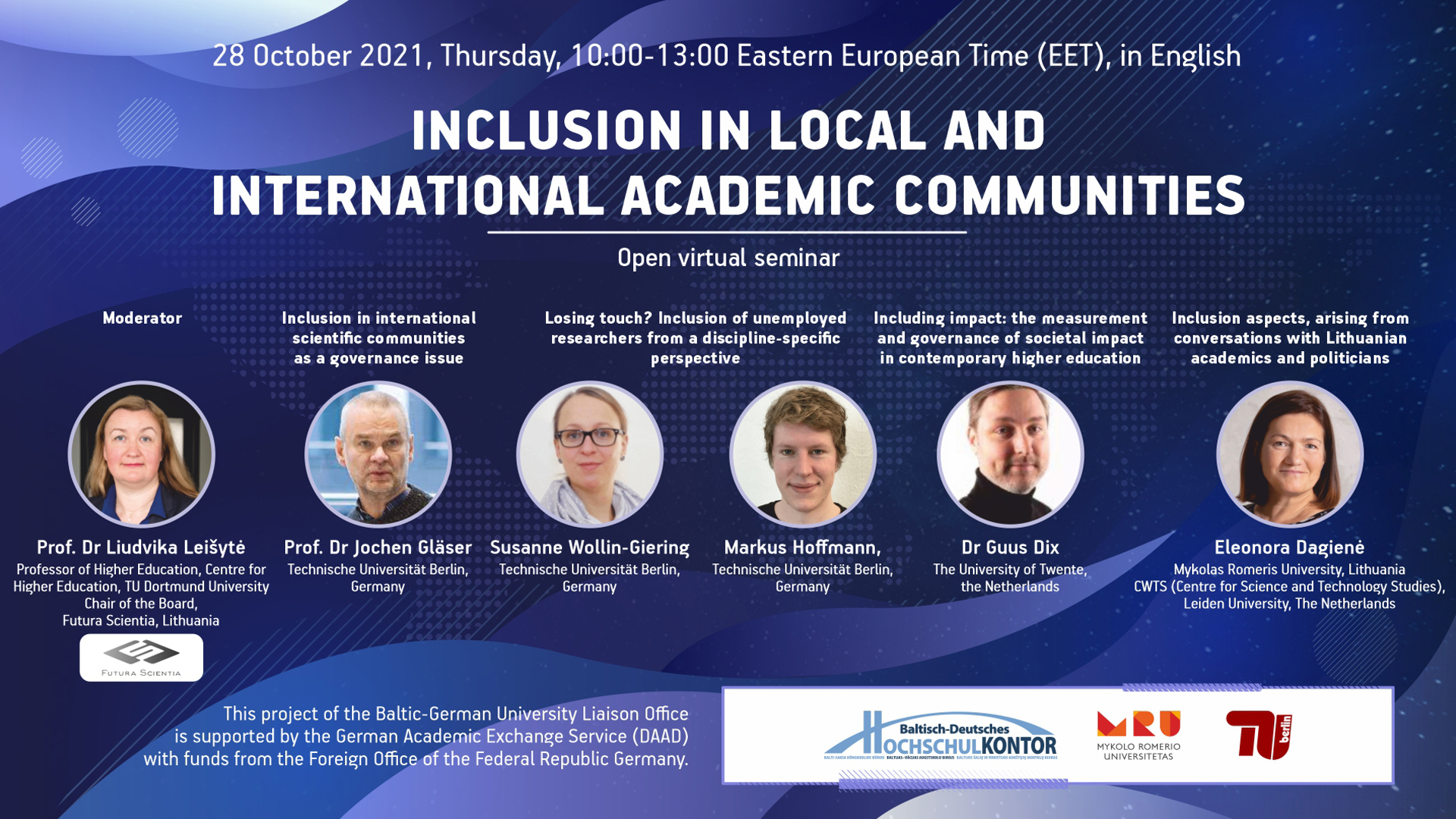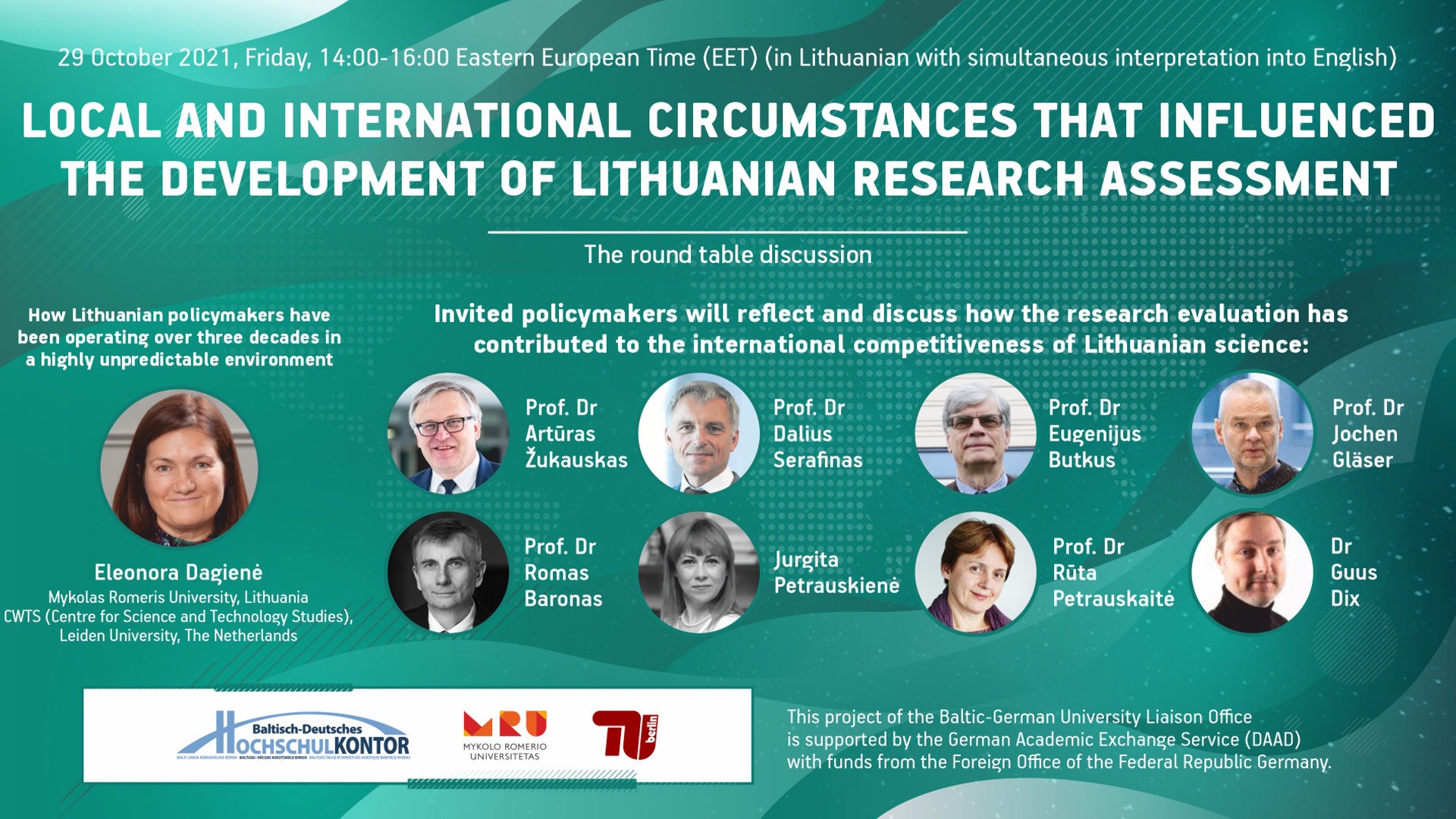This project of the Baltic-German University Liaison Office is supported by the German Academic Exchange Service (DAAD) with funds from the Foreign Office of the Federal Republic Germany: Inclusion in Local and International Academic Communities
Inclusion in Local and International Academic Communities
Research assessment has been in constant flux in Lithuania. After twenty years of experimenting with metric-based research assessment, policymakers introduced the Comparative Expert Assessment (CEA) along with additional measures––of economic and social impact––that were relatively new to Lithuanian academics. After CEA 2018, the experts stated that some areas were still stagnating and would probably not improve without focused efforts.
At the end of 2018, Eleonora Dagienė started her PhD research at CWTS (the Center of Science and Technology Studies at Leiden University, the Netherlands), seeking to investigate quantitative research assessment and its unintended consequences. Additionally, continuing her research at Mykolas Romeris University, Eleonora has sought to identify the drivers and barriers in applying national research assessment tools.
Through an in-depth analysis of more than fifty interviews, inclusion emerged as one of the significant and contentious issues. Policymakers use instruments to push Lithuanian researchers beyond the ‚local‘ towards international academic communities while researchers struggle with inclusion in both local and foreign communities.
These initial findings prompted Eleonora Dagienė to look for experts working on the inclusion topics and organise events to bring their knowledge to the community. The seminar and roundtable discussion are a result of that effort.
Downloadable programmes in PDF format: 2021 October 28 (inclusion in academia) and 2021 October 29 (policymakers’ perspectives)

28 October 2021, Thursday, 10:00-13:00 (UTC/GMT +3 hours), in English
open virtual seminar
Inclusion in Local and International Academic Communities
Moderator:
Liudvika Leišytė, Center for Higher Education, TU Dortmund University; Chair of the Board, Futura Scientia, Lithuania
10:00–10:20 (UTC/GMT +3 hours)
Welcome speeches:
Odeta Merfeldaitė, dean of the Faculty of Human and Social Studies, Mykolas Romeris University
Tadas Juknevičius, head of the Division of Science, LR Ministry of Education, science and sport
10:20–10:50 (UTC/GMT +3 hours)
Inclusion in international scientific communities as a governance issue
Jochen Gläser, Technische Universität Berlin, Germany
The original conception of scientific communities by Robert Merton, Thomas Kuhn and Michael Polanyi implied the idea that all members of scientific communities equally participate in the production of scientific knowledge. Meanwhile, science studies have uncovered many constraints that limit the participation of researchers in the knowledge production processes and decision processes of their scientific communities. Examples include constraints based on gender, ethnicity, access to means for research, or non-mainstream approaches in research.
To be included in one’s community’s knowledge production means a) producing contributions that are used by other community members, b) developing a reputation as a contributing community member, and c) exercising authority over community matters. The opportunities to do so are very unevenly distributed across and within countries. The governance of science affects inclusion through a) formulating expectations concerning inclusion and b) distributing the means for inclusion through shaping career paths and evaluation systems as well as distributing resources for research.
In small science systems, the governance of inclusion faces additional problems such as the difficulty to achieve critical mass for any research, the dependence of all quality assessments on international inclusion and a potential trade-off between international excellence and local societal impact, i.e. between inclusion in international scientific and national professional communities.
10:50–11:20 (UTC/GMT +3 hours)
Losing touch? Inclusion of unemployed researchers from a discipline-specific perspective
Susanne Wollin-Giering and Markus Hoffmann, Technische Universität Berlin, Germany
Unemployment in academia has hardly been studied so far, but there is anecdotal evidence of its occurrence in a wide range of disciplines. Moreover, there are examples of people continuing to do research while being unemployed with no negative consequences for their further career. This finding contradicts the predominantly negative studies in the sociology of work that have attested “scar effects” from unemployment – an increased likelihood of re-unemployment or permanently lower-quality jobs. For this reason, the practices of discipline-specific self-inclusion into the scientific community are of interest in understanding the extent to which researchers are able to mitigate “scar effects” and realise successful academic careers, especially in the context of unemployment depriving them of resources necessary for research.
In the presentation, we would like to introduce a recently started project on the functions and consequences of unemployment in researchers’ careers and illustrate it with some results on research practices that foster integration, such as informal communication, publishing activities or keeping up with the field‘s literature.
11:20–11:50 (UTC/GMT +3 hours)
Inclusion aspects, arising from conversations with Lithuanian academics and politicians
Eleonora Dagienė, Mykolas Romeris University, Lithuania; CWTS, Leiden University, the Netherlands
11:50–12:20 (UTC/GMT +3 hours)
Including impact: the measurement and governance of societal impact in contemporary higher education
Guus Dix, the University of Twente, the Netherlands
In the early modern period, ‘impact’ was a topic of great concern for natural philosophers who studied and theorised the effect one physical body could have on another. Currently, the term no longer excites natural scientists to a similar extent, but it does resurface in equally heated debates about higher education. It is central to the ‘Journal Impact Factor’ as a particular way of understanding scientific excellence. Even more notably, the term recurs in discussions of novel practices for measuring, monitoring and governing the broader consequences of science for society.
The presentation ‘Including impact’ will give an outline of a research project that covers the attempts of (European) policymakers, university managers, scientometricians and research groups to include ‘societal impact’ as a key criterion by which to judge science and scientists.
12:20–13:00 (UTC/GMT +3 hours)
General discussion

29 October 2021, Friday, 14:00-16:00 (UTC/GMT +3 hours)
the round table discussion (in Lithuanian with simultaneous interpretation into English)
Local and International Circumstances that Influenced the Development of Lithuanian Research Assessment
14:00–14:10 (UTC/GMT +3 hours)
Welcome speeches:
Inga Žalėnienė, rector of Mykolas Romeris University
Artūras Žukauskas, the Chair of the Committee on Education and Science of the Seimas of the Republic of Lithuania
Gintautas Jakštas, vice-minister at LR Ministry of Education, science and sport
14:10–14:25 (UTC/GMT +3 hours)
How Lithuanian policymakers have been operating over three decades in a highly unpredictable environment
Eleonora Dagienė, Mykolas Romeris University, Lithuania; CWTS, Leiden University, the Netherlands
14:25–15:25 (UTC/GMT +3 hours)
Invited policymakers will reflect and discuss how the research evaluation has contributed to the international competitiveness of Lithuanian science:
Prof. Dr Artūras Žukauskas
the Chair of the Committee on Education and Science of the Seimas of the Republic of Lithuania (Rector of Vilnius University, 2015-2020)
Prof. Dr Romas Baronas
the chair of the Research Council of Lithuania; the Institute of Computer Science, Vilnius University
Prof. Dr Dalius Serafinas
Head of the Lithuanian Society of Scientists; Head of the Quality Management Master’s Program, Vilnius University
Jurgita Petrauskienė
Counsellor for Education and Science at the Permanent representation of Lithuania to the OECD (The Minister of Education and Science, 2016-2018)
Prof. Dr Eugenijus Butkus
The Life Sciences Centre at Vilnius University (Chair of the Research Council of Lithuania, 2003-2013)
Prof. Dr Rūta Petrauskaitė
Department of Lithuanian Studies at Vytautas Magnus University (Vice-Chair of the Research Council of Lithuania for Humanities, 2008-2018)
Prof. Dr Jochen Gläser, Technische Universität Berlin, Germany
Dr Guus Dix, the University of Twente, the Netherlands
15:25–16:00 (UTC/GMT +3 hours)
General Discussion – what we would like to achieve!


